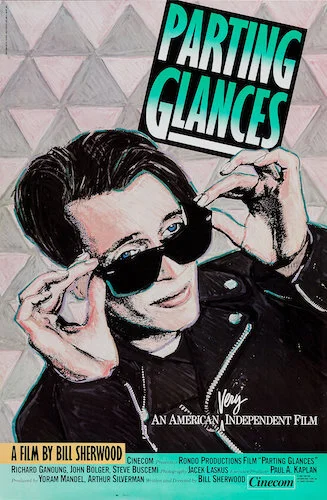Parting Glances: On-This-Day Thursday
Written by Andreas Babiolakis
Every Thursday, an older film released on this opening weekend years ago will be reviewed. They can be classics, or simply popular films that happened to be released to the world on the same date.
For February 19th, we are going to have a look at Parting Glances.
Independent cinema of yesteryear has such a different essence to it, especially since these films were usually authentically shoestring budgeted, or at least considerably less funded than other films being released at the same time (today, the term “independent” has taken on a few various meanings, and many indie films today are usually higher budgeted than these older works). Not having the means to have the highest filmmaking technology usually forced directors to either get creative, or be able to tell more heartfelt stories. For many marginalized people, independent cinema was the underground space where they could have their voices be heard, untainted by studio systems, judgemental glares, and misinformation brought forth by the prioritization of box office performances.
When I think ‘80s independent cinema that follows such a criteria, Bill Sherwood’s lone film Parting Glances is a sterling example. Sherwood was a budding filmmaker that passed away from AIDS related issues at the young age of 37. He had a number of written works ready to be picked up, yet nothing ever came of them, unfortunately. Luckily, we have access to the one feature he did make, and it’s a staple of both ‘80s indie films and the upcoming New Queer Cinema movement that would arrive at the turn of the upcoming decade. What I feel gets lost in a lot of perceptions of great films is that not every iconic work has to be massive in scope or technologically groundbreaking.
Even the humble films can carry a lot on their shoulders. Parting Glances spoke for entire communities amidst a time when AIDS was still being misrepresented through a fear-mongering, homophobic gaze. Of course, AIDS was still a new crisis at the time, but much of the media and entertainment concern surrounding it was unfounded and bigoted. Something like Parting Glances acts as a time capsule for the voices that dealt with the situation honestly, and helped nurture a community that has dealt with so much through the course of history.
Parting Glances is a romantic dramedy that offers the purest version of the genre, whilst carrying many essential voices on its shoulders.
At its barest form, Parting Glances is all but a romantic dramedy involving partners Robert and Michael over the course of twenty four hours; the former is getting ready to leave for work in Africa but is hiding the extremities of this trip (particularly its two year duration) from the latter. Michael takes care of his ex-boyfriend (Nick, played by a 29 year old Steve Buscemi), who is fighting AIDS; this relationship is not a secret, and Robert understands it fully (an important aspect to the film’s treatment of AIDS). It has lighter moments, usually punctuated with quick retorts and fun figures of speech. The love presented here is also not of two people falling for each other, but rather an established courtship where each partner knows the other inside and out. Parting Glances is highly naturalistic, and acts more as a snapshot of a point in time in hopes that future audiences will pay attention; we’re here, now.
When Parting Glances wishes to provide a more serious tone, it does just that. Nick might be a lot of fun, but he does divulge his inner thoughts to provide a candid look at a fear of death. Other discussions, particularly surrounding Michael and Robert’s conflicting endgames, are also sprinkled throughout the evening, but not without some of Sherwood’s warm sense of humour (or at least a tiny bit of it). Parting Glances isn’t afraid to get real when it comes to its drama, but Sherwood is so inviting with all of this, as if to say that the world is full of enough scares and trauma. This was a safe ninety minutes to get a real version of what a gay relationship in the ‘80s would look like, and how life with AIDS is. At no point is anyone’s orientations or well being used for the conveniences of plot, or to define them entirely. Sherwood’s film just has life existing with these characters, and that spoke volumes.
Despite being a relatively fun film, Parting Glances also carries its emotions on its sleeves.
As a film, Parting Glances is extremely standardly made (but, even then, Sherwood was destined to make motion pictures, and what he could do with such a slim budget is a testament of that). What Sherwood is able to achieve just by providing his voice and in the way he does so is immeasurable. In one film, Sherwood is charming, hilarious, empathetic, and pure. I’ll forever wonder what was going to come next from him, especially when he could have had more money to work with, because Sherwood’s first try with very little means is a home run. Its importance within the LGBTQ+ community is massive, even though its form is quaint. Parting Glances is essential as a well made film, a statement, a piece of history, and as an exercise of the barest basics of motion-picture crafting. Watching it will feel like a pleasant-yet-serious time, that concludes as simply as it exists. Yet you will still know the gravity of the weight it holds, and it will stick with you as much as any of the clever lines, intriguing detours and emotional passages will.
Andreas Babiolakis has a Masters degree in Film and Photography Preservation and Collections Management from Ryerson University, as well as a Bachelors degree in Cinema Studies from York University. His favourite times of year are the Criterion Collection flash sales and the annual Toronto International Film Festival.








